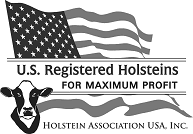
During the Holstein Association USA, Inc.'s 127th Annual Meeting, considerable time was spent discussing the proposed Cooperative Agreement between USDA-Agricultural Research Service (ARS)-Animal Improvement Programs Laboratory (AIPL) and the Council on Dairy Cattle Breeding (CDCB), as well as the draft Business Plan for the CDCB performing future U.S. dairy cattle genetic evaluations.
 Holstein Association Vice President Glen Brown (at right), speaking on behalf of the Board of Directors, led an interesting discussion on the topic. Excerpts from his presentation are included here.
Holstein Association Vice President Glen Brown (at right), speaking on behalf of the Board of Directors, led an interesting discussion on the topic. Excerpts from his presentation are included here. "For many years the United States Department of Agriculture, through its Animal Improvement Programs Laboratory (AIPL), has been working closely with major sectors of the dairy industry to provide genetic evaluations for dairy cattle. Those sectors include Holstein Association USA, Inc. (Holstein) and other breed associations, the dairy herd improvement (DHI) associations, and the artificial insemination companies (AI's) through their trade association, the National Association of Animal Breeders (NAAB).
Council on Dairy Cattle Breeding
"Some years ago, those three industry groups created the Council on Dairy Cattle Breeding (CDCB) to serve as a forum for discussion and to advise AIPL on industry research needs. The members of the CDCB and AIPL have, until recently, worked very well together and shared information and resources for the benefit of dairy farmers and the industry.
"AIPL manages the genetic evaluations, conducts research, and provides equal access to the information. This system is of great benefit to all segments of the industry; dairy farmers, industry partners like the Holstein Association, and consumers alike. This beneficial collaboration is now being threatened.
Concerns
"The CDCB has no budget or assets, nor has there been any need since its only purpose is to provide advice to AIPL. Now, however, some members of the CDCB are proposing a Cooperative Agreement with AIPL. A change such as this has the potential to have a profound impact on you, your Association, and the industry at large.
"One of the things we have been concerned about as an Association is that, if the Council changes from an advisory to a functioning business entity, the rules of governance, management, and finances must be considered properly and put in place before a cooperative agreement might be signed. It's critical that we don't sign it and later find out how it might work.
"We believe, if a change is made, the business plan should come first with the business structure in place. A cooperative agreement would then be formulated that would be consistent with the business plan.
U.S. Dairy Genetic Evaluations Should Stay at USDA
"We believe the advantages of keeping the U.S. dairy genetic evaluation program at USDA outweigh any disadvantage. In support of that contention, HAUSA would be willing to pay an annual fee for USDA's part in the U.S. genetic evaluation program if lack of funding is really at the root of this issue.
"The Holstein Association USA Board is committed to keeping the dairy genetic evaluation program at USDA-AIPL."
For additional information and to hear Glen Brown's presentation in its entirety, please visit the Holstein Association USA website at www.holsteinusa.com.
07.25.2012